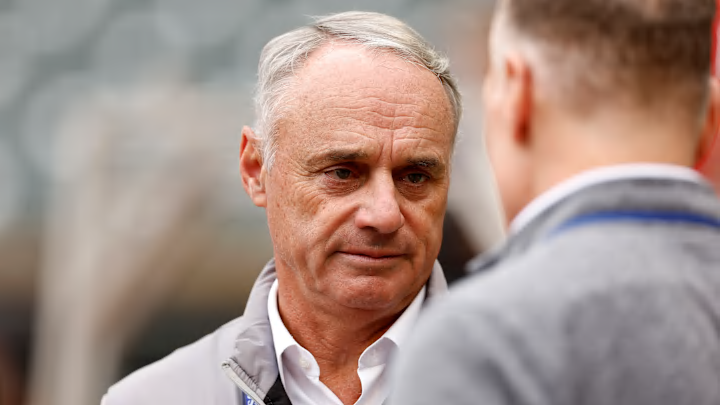Picture this: you've put in a long day at the office and are excited to come home. You kiss your wife, hug your kids, and pet your dog. You all have some dinner, and then you settle on the couch together so that you can watch your favorite baseball team play. You're living the American dream. There's only one problem. It's blacked out.
Does this sound ridiculous? Yes, it does. Does it happen all the time? You bet!
For some reason that defies explanation, sports leagues have continued to rely on archaic blackout rules that often make it impossible for fans to watch their teams play, and on Thursday we saw the perfect distillation of how absurd blackouts really are.
OTD: The Chicago White Sox game was BLACKED OUT AT The White Sox Game. pic.twitter.com/573P7lQ5cV
— Wretched 2024 WHITE SOX (@SultanOfClout) April 4, 2024
That's right, ladies and gentlemen. The pro shop inside Guaranteed Rate Field, home of the Chicago White Sox, could not air the White Sox game currently being played at the stadium the pro shop was located in because it was blacked out.
What are we doing here, Rob Manfred?
MLB blackout rules need to be eradicated for the good of the game
Blackout rules exist, in theory, to drive people to the ballpark. The idea is that if everyone could sit in the comfort of their own homes and enjoy the games, it would discourage people from making the trip to the stadium, where they would ostensibly have to purchase a ticket, parking, and concessions. This means less revenue for the teams and the league, so to ensure fan turnout, local networks can't carry the games if a certain threshold of tickets sold hasn't been met.
Let's take it back to our example in the first paragraph. You've still come home after a long day and greeted the family. Are all of you going to pile into the car and head to the ballpark? Almost certainly not. I've got a wife and three kids. Maybe we'll go to a few sporting events a year, but we're certainly in no position to get season tickets and attend 81 games a year, even if we did live near a major league team. Oftentimes, if I want to go to a game, I go by myself or take one other person. Even at the cheapest ballparks, a night out with a family of five is going to run a pretty penny. It's just not realistic to expect people to do that.
Even if I got a single season ticket and went to all of the games myself, thereby abandoning my family, how does it grow the game to make it so that my kids can't watch it from home? Baseball and every other sport are in fierce competition for people's attention, and younger fans are, by and large, saying no thanks. This doesn't help attract people to the sport.
Blackout rules don't even make sense, geographically speaking. I live in Raleigh, North Carolina, but I'm originally from New York. I root for the Mets (yes, life is rough, thanks for asking). I buy MLB's package so that I can see every Mets game, but when they play the Nationals or Orioles, I'm out of luck. Why? I couldn't even begin to tell you.
For some reason, both of those teams are blacked out here. Does Major League Baseball expect me to make the hours-long drive to Washington or Baltimore, then stay there for three or four days so I don't miss a game? Apparently, they do, but that's not going to happen.
When games are blacked out in the stadium that they're actually being played in, it's obvious that something is broken with this system. Like my Mets, the White Sox are 1-5, and as one commenter on the above post stated so eloquently, "It's better this way. They should black out the season. Nobody needs to watch this crap."
Maybe instead of penalizing people who just want to watch their teams, that's what Rob Manfred should actually be worrying about.
